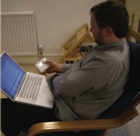Wireless control of individual radiators is the final energy-efficiency touch

The finishing touch for the energy-efficient operation of the home of Dr Michael Lamperth, a developer of energy-efficient vehicle technologies, is the use of Honeywell wireless controllers on individual radiators
To minimise the energy consumption of his super-efficient home-heating system, Dr Michael Lamperth, a world-renowned developer of energy-efficient vehicle technologies, uses wireless Honeywell heating control of individual radiators. These controls heat rooms only when required and only to the temperature that has been preset for that time of day. Dr Lamperth is a lecturer in the Department of Mechanical Engineering at Imperial College London, and his powertrain research is expected to have profound global significance in the design of energy-efficient electric and hybrid vehicles. His 4-bedroom family home was built in 1900 and doubled in size in 1980. He explains, ‘The wireless system is the Honeywell CM Zone, which transmits from a central unit to wireless controllers on radiators. It ensures only rooms being used are heated, and then only to the temperatures necessary for comfort. ‘Rooms are grouped in heating zones, depending on the times of day they are used. For example, the kitchen and breakfast room zone is heated only in the morning and at lunchtime. Meanwhile, the family rooms, study and bathroom are in a zone with a different heat pattern focused on warmth during the evening.’ The Honeywell wireless zone controls can change the temperature in each zone up to six times per day. They can also set a different time and temperature program for each day of the week, which is useful at weekends when heating needs differ. The temperatures in the children’s bedrooms are currently controlled by thermostatic radiator valves as they are only heated individually when used. If these are grouped into an additional wireless heating zone in the future, the existing thermostatic heads can be unscrewed and replaced by Honeywell wireless controller heads. A solar-powered hot-water system was installed in 2007, and no gas was used for hot water from April to October. Solar-heating specialist Rayotec installed Schott solar panels and a 250 litre hot-water cylinder. Dr Lamperth says, ‘We get 250 litres of hot water at 40°C, even on a cloudy day.’ The hot water may need topping up using the gas boiler at other times of the year, but the control system avoids such hot water being stored overnight so that solar energy cannot be used the next day. Other energy-efficiency measures have included cavity-wall insulation, double glazing and replacing the original gas-fired boiler with a Vaillant ecoTEC plus 428 condensing boiler. Dr Lamperth says, ‘For me, energy efficiency is a way of life. In my home as well as in my research, I always ask myself if there is a more eco-friendly way to do things — but that’s what we should all be doing.’
Related links:









